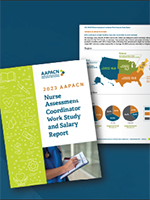NACs Like a Reasonable Challenge: 2023 AAPACN NAC Work Study and Salary Report
Over the last few years, nurse assessment coordinators (NACs) are being hired with less long-term care experience, being paid more, and facing a multitude of challenges including stress and burnout, staffing shortages, and increased workloads. The 2023 AAPACN NAC Work Study and Salary Report received responses from 632 NACs. The …


